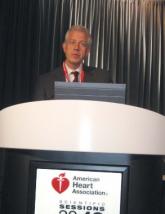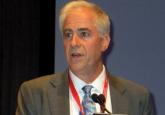News

PCSK9 Antibodies Safely Cut LDL in Phase II
Major Finding: Patients on the largest Amgen 145 dosage had an average 66% reduction in their LDL cholesterol, and 90% reached their goal LDL...

AT ACC 14
WASHINGTON – The novel low-density lipoprotein cholesterol–lowering agent evolocumab took day 1 of the annual meeting of the American College of Cardiology by storm on the strength of three resoundingly positive phase III clinical trials.
"These three studies presented today I think are nothing short of revolutionary," session cochair Dr. Gregory S. Thomas said in an interview after the presentations.
"To be able to uniformly achieve a 50%-60% further reduction in LDL in patients already on diet, on statins, and often on ezetimibe, and to bring almost all the patients down to LDL levels that most clinicians would be satisfied with is just remarkable," observed Dr. Thomas, medical director of the MemorialCare Heart & Vascular Institute at Long Beach (Calif.) Memorial.
Evolocumab is an investigational fully human monoclonal antibody that inhibits proprotein convertase subtilisin/kexin type 9 (PCSK9), an enzyme that plays a major role in regulating LDL cholesterol levels. In earlier phase II studies it showed impressive efficacy in LDL lowering. As a result, the eagerly anticipated phase III trials drew throngs. Even before the new-research session got underway, fire marshals stood in the doorways and turned away large numbers of disappointed meeting attendees.
The showstopper was DESCARTES (Durable Effect of PCSK9 Antibody Compared with Placebo Study), to date by far the longest randomized, double-blind, placebo-controlled clinical trial of any PCSK9 inhibitor. The 52-week study randomized 901 participants 2:1 to evolocumab by subcutaneous injection at 420 mg every 4 weeks or placebo on top of background lipid-lowering therapy optimized in an effort to reach National Cholesterol Education Campaign ATP III LDL goals. The background therapy options ranged from diet alone, to diet plus atorvastatin at either 10 or 80 mg/day, to high-dose atorvastatin plus ezetimibe at 10 mg/day. DESCARTES participants had to have an LDL cholesterol level of 75 mg/dL or more after up to 16 weeks of the run-in background therapy. At randomization, their mean LDL cholesterol level was 104 mg/dL.
The mean placebo-adjusted reduction in LDL cholesterol from baseline to week 52 – the primary study endpoint – was 57% in the evolocumab group. Moreover, 82% of patients in the evolocumab group achieved an LDL below 70 mg/dL, compared with just 6.4% of the control group, reported Dr. Dirk J. Blom of the University of Cape Town, South Africa.
The LDL cholesterol lowering was accompanied by a placebo-adjusted 42% reduction in apolipoprotein B, a 28% drop in lipoprotein(a), a 9% decrease in triglycerides, a 6% boost in HDL cholesterol, and a modest but statistically significant 2% rise in apolipoprotein A1, he added.
There was no diminution in evolocumab’s LDL cholesterol–lowering effect over the duration of the study. It was the same at week 52 as at week 12. The evolocumab group showed no significant changes over time in fasting blood glucose or glycosylated hemoglobin. Rates and types of all adverse events, including injection site reactions, abnormal liver function tests, and elevations in creatine kinase, were essentially the same in the evolocumab and control groups. One patient developed transient anti-evolocumab–binding antibodies during treatment with the PCSK9 inhibitor; however, no one developed anti-evolocumab–neutralizing antibodies.
The same themes of massive reductions in LDL cholesterol along with a side effect profile mirroring placebo emerged from the other two phase III trials, RUTHERFORD-2 and MENDEL-2.
RUTHERFORD-2 (Reduction of LDL-C with PCSK9 Inhibition in Heterozygous Familial Hypercholesterolemia Disorder) was a 12-week, double-blind, placebo-controlled trial in 329 patients with heterozygous familial hypercholesterolemia. Their mean baseline LDL cholesterol was 154 mg/dL, even though all were on statin therapy and about 60% were also on ezetimibe. They were randomized 2:1 to evolocumab or placebo on top of their background lipid-lowering regimen. The evolocumab group was randomized to monthly injections at 420 mg, as in DESCARTES, or to home biweekly injections at 140 mg delivered by prefilled autoinjector using a 27-gauge needle. The two dosing regimens proved clinically equivalent in efficacy and lack of side effects. At 12 weeks, 68% of patients on biweekly evolocumab and 63% on monthly therapy had an LDL cholesterol level below 70 mg/dL, compared with 2% on placebo, according to Dr. Frederick J. Raal of the University of the Witwatersrand in Johannesburg, South Africa.
A new and effective treatment option for patients with heterozygous familial hypercholesterolemia would be most welcome, he noted. This is the most common of all autosomal dominant inherited disorders, with an estimated prevalence of 1 in roughly 300, meaning more than 1 million people are affected in the United States alone. The disorder is characterized by markedly elevated LDL levels that often can’t be brought down to target despite maximal current therapies. Untreated men with heterozygous familial hypercholesterolemia typically have their first coronary event in their 40s, women a decade later.

Major Finding: Patients on the largest Amgen 145 dosage had an average 66% reduction in their LDL cholesterol, and 90% reached their goal LDL...

Major finding: Treatment with evolocumab every 4 weeks for 1 year safely cut average LDL cholesterol levels by 50%, compared with controls.Data...
